On January 22, a special court in Ambedkar Nagar district, Uttar Pradesh, designated for cases involving crimes against socially disadvantaged castes, convicted Pastor Jose Pappachan and his wife, Sheeja Pappachan. They were sentenced to five years of imprisonment and fined Rs 25,000 each. The court found them guilty of orchestrating a conversion racket targeting vulnerable Dalits in the region.
The case originated on January 24, 2023, when an FIR (No. 31/2023) was registered at Jalalpur Police Station in Ambedkar Nagar. The complainant, Chandrika Prasad, a district secretary of the Bharatiya Janata Party (BJP), accused Pastor Pappachan and his wife of coercing Dalits in the area to convert to Christianity. He alleged that the couple had been actively involved in conversion activities for the past three months, exploiting the vulnerability of the community to expand their influence.
Following the complaint, the couple was charged under Section 3(1)(d) of the Scheduled Castes and Scheduled Tribes (Prevention of Atrocities) Act, along with Sections 3 and 5(1) of the Uttar Pradesh Freedom of Religion Act, 2021. They were subsequently taken into custody and remained in jail during the trial.
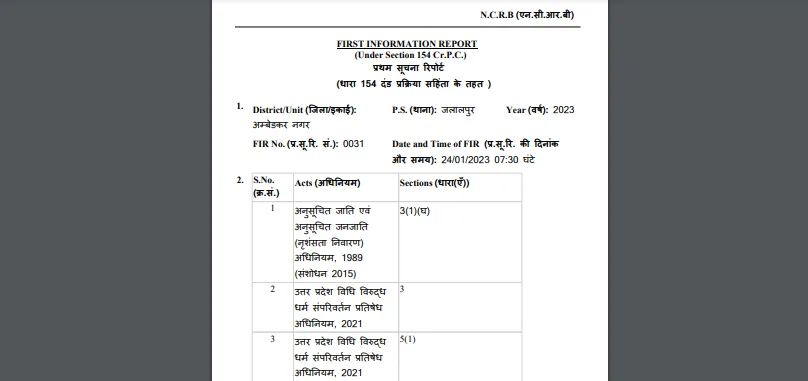
The chargesheet was filed under FIR No. 31/2023, on March 17, 2023, and the court took cognisance of the case.
On March 31, 2023, charges were framed under the same sections, but the accused denied the charges and opted for a trial. Subsequently, on October 8, 2024, the court amended the ordinance references in the charges, finalising them under the UP Freedom of Religion Act, 2021, before delivering its verdict.
Witness Testimonies in Conversion Case: Key Statements
As per the order (number: 166/2023), witness testimonies shed light on the conversion activities of Pastor Jose Papachan and Sheeja.
Chandrika Prasad
Chandrika Prasad, a Dalit social worker, stated that on January 30, 2023, he received information from villagers about Pastor Papachan and Sheeja converting Dalits in Shahpur Firozpur Dalit Basti through inducements. Angered by the incident, Prasad immediately informed the local police, leading to the arrest of the accused and the recovery of conversion-related materials. He emphasised the mental distress caused to the Dalit community by these activities and confirmed filing a written complaint.
Lavkush’s Testimony
Lavkush, an illiterate resident of the Lona Chamar caste, testified that the accused frequently visited his neighbour Viphala’s house, teaching Bible lessons and distributing religious materials. He recalled that the accused invited villagers to their church in Manguradila and distributed church books. He also mentioned a gathering on December 25, where the accused celebrated Jesus Christ’s birthday by cutting a cake and offering sweets to the villagers. Lavkush identified the accused in court as the same individuals involved in these activities.
Viphala’s Testimony
Viphala, also from the Lona Chamar caste, stated that the accused regularly visited her house, teaching her and other villagers about Christian teachings. She recounted how they provided Bible books and encouraged villagers to gather at her home for prayer meetings. She confirmed that the accused celebrated Jesus Christ’s birthday on December 25, distributing food and displaying a photo of Jesus Christ.
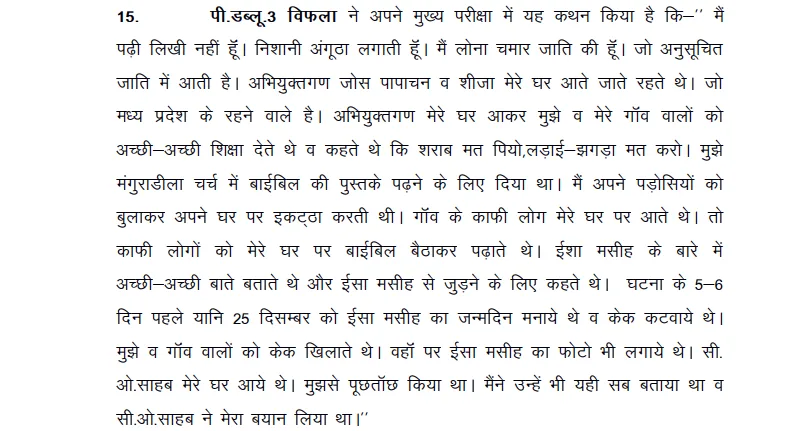
Manju’s Testimony
Manju, a resident of the Lona community (Scheduled Caste), testified: “I am uneducated and belong to the Lona community. Around seven months ago, at approximately 1:00 PM, the accused, Jose Papachan and Sheeja, residents of Madhya Pradesh, came to the house of Viphala Devi in my village to propagate Christianity. Viphala often invited me and other villagers to her house.
When villagers gathered, the accused preached about Jesus Christ, urging us to worship him and join Christianity. They also organised prayer meetings where children, including my own, participated. They promised educational materials such as free notebooks, books, and pens.
The accused gave me a Bible, instructing me to give it to a literate person in my household to read aloud. They also distributed books to Viphala in my presence and conducted prayer meetings, including celebrating Jesus Christ’s birthday with food distribution.
Disturbed by these activities, I contacted Dr. Chandrika, a BJP leader from Jalalpur (3 km away), who also belongs to the Scheduled Chamar caste. I informed him about the incident, after which he visited our village and lodged a complaint at Jalalpur Police Station.”
Suramani’s Testimony
Suramani, another witness, shared her account: “I am uneducated, as are most residents of my village. Nearly a year ago, the accused, Josh Papachan and Sheeja, began visiting our village regularly. They taught our children, sharing knowledge and lessons from the Bible. The accused often gathered villagers at Bifla’s house to discuss Jesus Christ and encourage us to join Christianity. They organised community meals (bhandaara) and distributed Bible books. CO Sahab later recorded my statement about these activities.”
Anjani’s Statement
Anjani, in her main examination, stated, “The incident occurred approximately one year and ten days ago. For about a month before the incident, I began visiting my neighbour Viphala’s house. During this time, the accused, Josh and Seeja, frequently visited our village and gathered people at Viphala’s house. They taught Bible lessons and distributed Bible books to me, Viphala, Roshni, Malti Devi, Heera, and others, encouraging us to read them. Josh and Seeja also taught my children and other children from the village. They would talk about Jesus Christ, urging us to worship Him, declaring that ‘Jesus Christ is our God,’ and asking us to join Christianity.
The accused also gave me Bible books and money as an incentive. Over the course of five to six months leading up to the incident, they repeatedly asked me to convert to Christianity, using monetary offers to entice me. Both Josh and Seeja tried to exploit our illiteracy, coercing us to embrace Christianity. They provided a calendar depicting Jesus Christ to me, which had His image printed on it. In our village, they organized celebrations for Jesus Christ’s birthday and hosted feasts for the villagers. Following the incident, CO Sahab recorded my statement.”
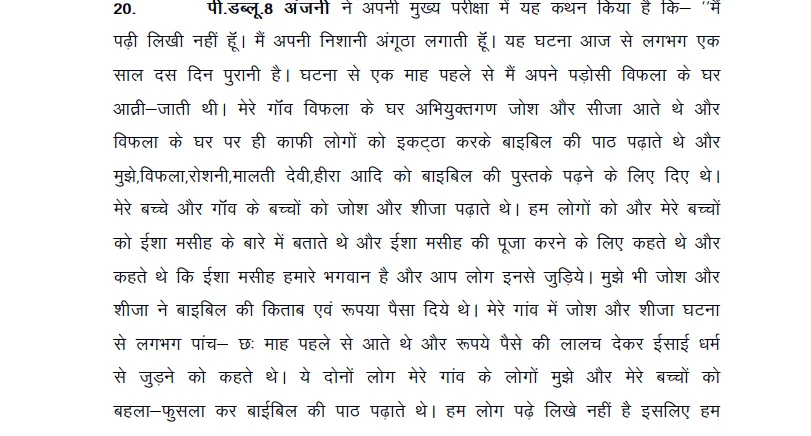
Roshni’s Statement
Roshni, in her examination-in-chief, stated, “I am illiterate and use my thumb impression for official purposes. I belong to the Lona community, categorised as a Scheduled Caste. The incident occurred approximately one and a half years ago. My neighbour, Viphala, hosted the accused, Josh Papachan and Seeja, at her house. These individuals conducted Bible lessons there, which many villagers attended. They encouraged us to convert to Christianity, asserting that it would benefit us.
The accused also celebrated Jesus Christ’s birthday in our village, hosting feasts for the villagers. I was given a calendar featuring Jesus Christ’s image by the accused, which I later handed over to the Jalalpur police. The police took my thumb impression on the related documents after completing the paperwork. Paper number 73/5, which contains my thumb impression, is attached to the file. I verify its authenticity, marked as Exhibit A-6. CO Sahab also recorded my statement.”
Police Statements and Evidence
Devendra Kumar, the investigating officer, detailed the procedural steps: “On receiving the case documents on 24.01.2023, I inspected the site and recorded witness statements, including those of Viphala, Malti, Bhagmani, Lavkush, Kalavati, and Roshni. Various materials, including Bibles, diaries, and calendars with Christian imagery, were seized from Viphala’s house and documented in the case diary. The accused, Jose Papachan and Sheeja, were arrested, and their statements were recorded.”
Recovered Materials
Evidence collected from the accused included: One “Children’s Picture Bible” book, Four large diaries with black bindings, three of which had ‘Holy Bible’ written on the first page, and two bore the logo ‘BSI.’ Two small diaries, one labelled ‘New Testament Idioms International’ and the other ‘Pyar Ka Uphaar.’ Four calendars from the possession of women, including Viphala and Roshni. Two calendars displayed images of Jesus Christ, while the others featured related figures.
What does the order say?
Upon reviewing the statements of all witnesses presented by the prosecution, it is evident that the accused, residents of Madhya Pradesh/Kerala, travelled to the village of Shahpur Firozpur, under Thana Jalalpur in district Ambedkar Nagar. They engaged with members of the Dalit community, teaching them the Bible, promoting the teachings of Jesus Christ, and attempting to lure them into converting to Christianity through monetary incentives, the distribution of books, and the organisation of feasts.
The accused have not provided any clarification regarding their motive or purpose for travelling such a significant distance to Shahpur Firozpur, a village where they have no local residency or ties. The evidence presented by prosecution witnesses establishes that the accused attempted to induce mass religious conversions among the Dalit community through illegal means.
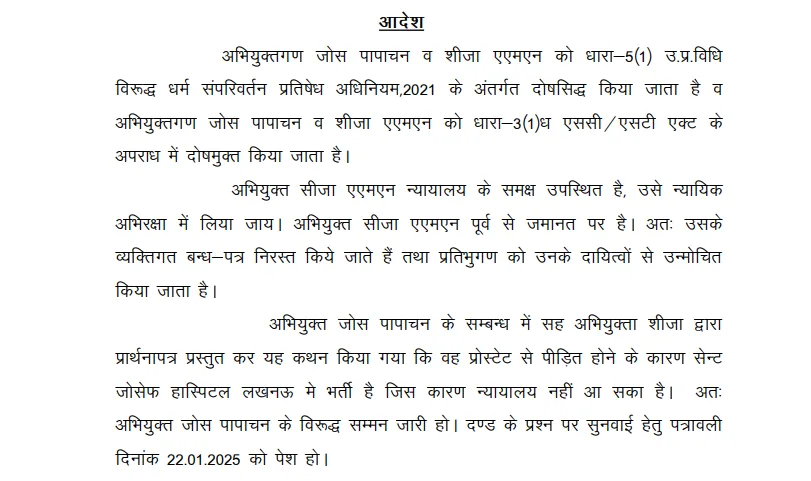
However, regarding the charges under Section 3(1)(g) of the SC/ST Act, none of the prosecution’s witnesses testified that the accused publicly abused any individual belonging to the SC/ST community. Consequently, the offence under Section 3(1)(g) of the SC/ST Act is not proven against the accused.
In light of the above findings:
- Accused Jose Papachan and Sheeja AMN are convicted under Section 5(1) of the Uttar Pradesh Prohibition of Unlawful Conversion of Religion Act, 2021.
- Accused Jose Papachan and Sheeja AMN are acquitted of charges under Section 3(1)(g) of the SC/ST Act.
Similarly, Organiser reported on March 18, 2024, about Madhya Pradesh’s first conviction under its Anti-Conversion Law involving a Dalit victim. On March 11, the Sagar District Court convicted Ramesh and Sakhi Masih for enticing a Dalit man to convert to Christianity. Both were sentenced to two years of rigorous imprisonment and fined Rs 25,000 each. However, a third accused, Nahuram Masih, was acquitted due to a lack of sufficient evidence.


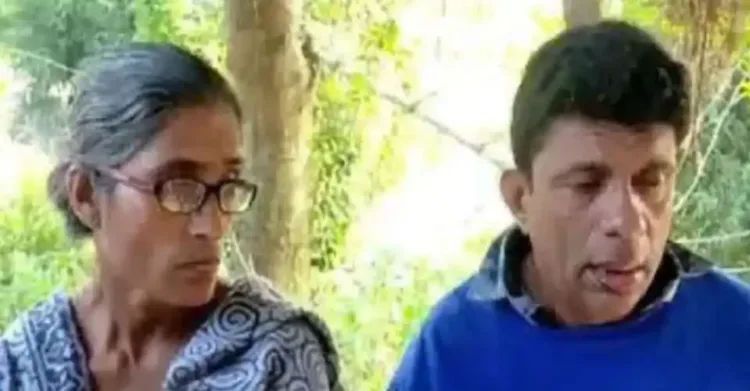
















Comments